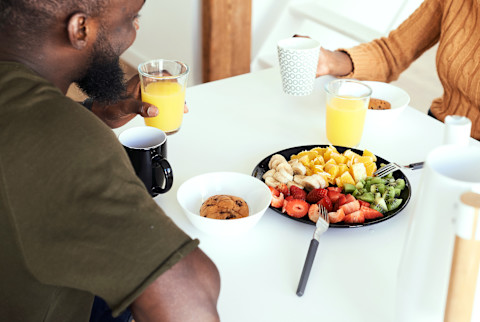The One Thing I Gave Up That Made A Massive Difference In My Anxiety

I don't drink coffee. I don't drink matcha, or black tea, or green tea, or even white tea.
There, I said it. I'm a health food writer and editor, and I avoid caffeine completely.
I wasn't always like this. I spent my high school years trying to fit in with my friends at the local coffee shop, loading up on whipped concoctions with enough sugar to be considered more of a dessert than a drink. In college, I played around with coffee as a study aid, mostly because (again) it's what my friends were doing. It never made me feel good, though, leaving me with a bit of a stomachache and sweaty palms whenever I tried it. And as I got older and my anxiety became more pronounced, it started to have even more negative effects. This isn't surprising, according to holistic psychiatrist and mbg Collective member Ellen Vora, M.D.
"Caffeine is a drug, and it's anxiety-generating," she explains. "Caffeine says to the body, 'We're gonna mount this big wakeful energized state.'" According to Vora, real energy comes from being rested, having healthy mitochondrial function, and eating well. But the energy that caffeine creates is a type of false energy. "Caffeine simulates wakefulness by creating a stress response. It makes your body release cortisol or adrenaline, which wakes you up but also essentially puts your body into fight-or-flight mode, like you're running from a tiger."
That doesn't mean everyone should avoid caffeine completely. "Some people do well with it, and all cultures throughout the world throughout time have had some sort of caffeine drink," says Vora. "In some communities around the world, it seems to be a net positive."
That positive benefit might come down to your genetics, explains Will Cole, D.C., a top functional medicine practitioner, mbg Collective member, and best-selling author of Ketotarian. "We are born with two copies of the CYP1A2 gene," Cole explains. "This gene controls the enzyme of the same name that determines how you metabolize caffeine—fast, meaning you can tolerate it well, and it leaves your system quickly, or slowly, meaning your body doesn't process it as efficiently, and it stays in your system longer."
The number of copies you have of the slow or fast variant determinate how you react to caffeine. "You receive one copy from your mom and one copy from your dad, and if you have two copies of the slow variant—and in some cases, one slow and one fast—you are more likely to feel the effects of caffeine including anxiety and jitters," Cole says. "So, next time you feel a little anxious from your morning cup of joe, blame your parents."
Blame aside, the best way to find out whether caffeine is affecting your anxiety is simply to eliminate it from your life. But don't go cold turkey, cautions Vora. "It's a real drug, with a real withdrawal, so do it super-gradually. Commit to tapering gradually over the course of a few weeks. Turn a few cups a day into half-caf, then transition those to black tea, then to green tea, then to just a few sips; then go off it." If you eschew caffeine altogether, you'll feel so tired, achy, and unwell from the withdrawal that you won't be able to properly measure the drug's impact on your anxiety.
Vora herself recently eliminated caffeine, a move she credits with helping her experience improved sleep, more energy, less jitters, less sweat, and less bladder discomfort and urinary urgency.
For me, giving up caffeine was critical to my anxiety journey—and, as Vora says, I love being able to address my exhaustion at its root rather than mask it with a substance. My husband, on the other hand, has four to five cups a day and loves the smell and the slow, methodological actions of his morning pour-over. The key is to be honest with its impact on your body and do what's right for you.
